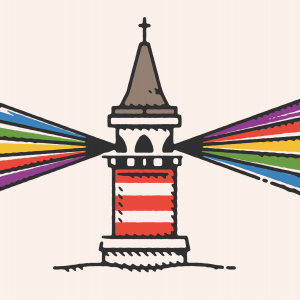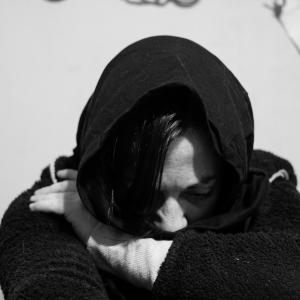
Emmy Kegler is pastor of Grace Lutheran Church in Minneapolis, co-leader of the Queer Grace Community, and author of One Coin Found and All Who Are Weary. Emmy is also the founder and editor of Queer Grace, an encyclopedia of online resources around LGBTQ life and faith. She was raised in the Episcopal Church and spent some time in evangelical and non-denominational traditions before finding her home in the ELCA. Emmy serves a congregation full of servant-hearted people working hard to tell the story of Jesus in a way that embodies love for God and for their neighbor. She lives in Saint Paul and enjoys biking, board games, books, beer, and babysitting her fiancée’s dogs.
Posts By This Author
Beyond the Trauma Narrative
THE RELIGIOUS FAITH of LGBTQIA+ people remains, in religion reporting, a puzzlement.
For those of us in the LGBTQIA+ family who were raised in religious—especially Christian—households, our churches have often demanded that we choose between our faith communities and our identities. Until recently, genuine LGBTQIA+ role models of faith were markedly rare. Too often, especially in evangelical communities, so-called role models were promoted because they publicly renounced their sexuality or identity in exchange for “faithful” pursuit of celibacy and gender conformity. Many of us can recount horror stories of religious trauma by those who rejected and condemned our essential selves. It’s not surprising that many of us run from religions dedicated to instilling self-hatred in us.
Yet a survey of LGBT adults in the United States shows they maintain relationships with faith and spirituality at rates similar to all Americans. Twenty percent of LGBT adults in the U.S. (compared to 25 percent of all Americans) say they attend religious services at least once a week, and 47 percent consider themselves religious. (Among all Americans, 41 percent say religion is “very important” in their lives.) If LGBTQIA+ people are engaged with their faith at similar rates to other Americans, why aren’t they centered as positive examples in religion reporting? Last December, Julia Métraux at the Poynter Institute reported on a lack of coverage in religion reporting on LGBTQIA+ communities and on the importance of queer reporters and editors in centering those stories.
The Forgotten Mothers of the Bible
Because of my faith, my story is bound up in the story of others: Stories that filled the backgrounds of my childhood Bible, and stories that friends and family have had to bear, often without recognition or compassion.
To celebrate Mother’s Day, I begin by remembering the many biblical stories of motherhood — stories that too many of us forget, or lack words, to celebrate.
The Unintended Consequences of a Spiritual Discipline
To adults new to Christian practices of fasting during Lent, the idea can seem facetious — some sort of trendy way of worshipping both Jesus and our own well-defined abs. But for many, fasting has been a way of cleansing not the body but the mind. Temporary self-denial can invite us to compassion for those who are hungry not by choice, to a remembrance of the trials of Jesus, or to better appreciation of food when we do eat. But in the face of a world that already pressures many into self-denial, self-deprivation, and self-harm, the strength of the spiritual discipline of fasting cracks.


